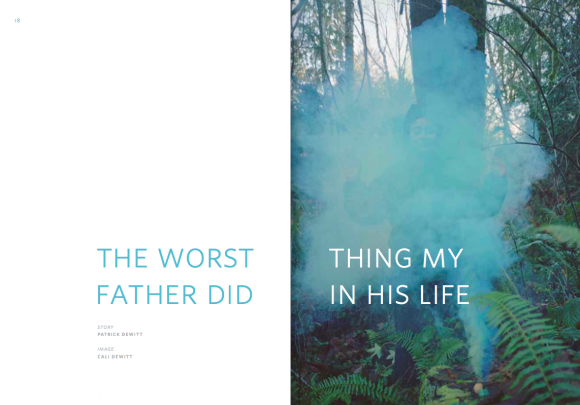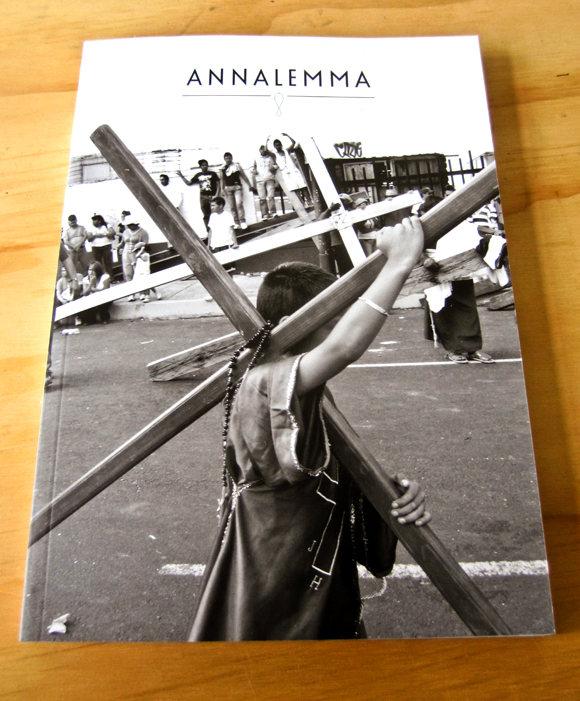Patrick deWitt‘s debut novel, Ablutions (Houghton Mifflin Harcourt, 2009), spiraled readers into the whiskey soaked underbelly of Hollywood bars beyond any semblance of celebrity or glamor culture. His follow-up, The Sisters Brothers (Ecco, May 2011), takes place in Gold Rush era Oregon, following assassins Eli and Charlie Sisters, on their journey to California to dispatch an inventor. He also wrote the script for the upcoming teen dark comedy Terri, directed by Azazel Jacobs. DeWitt’s story appearing in Annalemma Issue Seven: Endurance, The Worst Thing My Father Did in His Life, concerns a man recounting a horrible act to his son over breakfast. This interview was conducted via email.
Annalemma: The father in this story engages in some pretty horrible behavior. A lot of your characters are prone to doing truly bad things. What’s interesting about people committing awful acts?
Patrick deWitt: I come from a long line of unabashed gossips, and addressing your question from that point of view, I can say that unpleasant behavior makes for a superior topic to pleasant behavior. I’ve been losing interest in wholly terrible people lately, actually, and have taken an interest in partially terrible people. They’re not as exciting, but easier to be around.
A: Saying something’s an awful act is a bit of a judgment call. What’s awful to one person is acceptable to another. It seems like the father and the son in this story are seeing it from both an angles. They laugh about these terrible things the father did, maybe out of some male bonding instinct, then they immediately feel remorse. What constitutes an awful act?
PD: I guess it could be defined as a hurtful happening that could have easily been avoided but wasn’t for reasons of laziness or selfishness. So yes, the act in the story absolutely qualifies as awful.
A: The awful act in question is perpetrated against a woman. What do you see this story saying, if anything, about the way men treat women in this country? In this generation?
PD: I wouldn’t intentionally address any ideological platform in my fiction for the same reason I wouldn’t put an ideological bumper sticker on my car — because it would fill me with a sense of futility. And it’s crucial that I feel just the opposite when writing. What happens in the story is despicable, but it’s not there to illuminate an opinion or take anyone to task. Commentary is someone else’s job.
A: Even though I knew from the beginning that that father was going to do something terrible, his bravado made him attractive, funny even. What is it about assholes that make people gravitate toward them?
PD: Assholes lead exciting lives! Their days are filled with wild feelings and insane miscommunications. Also, they’re typically solitary or independent, and human nature leads us to seek the favor of people who can take it or leave it.
A: Let’s talk about some stuff happening down the road. According to the IMDB page, Terri is in post production. Can you talk about that at all?
PD: Only to say that it was an honor to work with such a talented group of people, and that I’m proud to call Azazel Jacobs my friend.
A: The Sisters Brothers takes place in Gold Rush era Oregon. How much research was involved when you sat down to write historical fiction and how did the writing process differ form Ablutions?
PD: The research process was not what you would call rigorous. Basically, I read one Louis L’Amour novel (Heller With a Gun), and looked at the pictures in a Time-Life book called The Forty-Niners. There were times I needed specific information (How many hands tall is a tall horse? What are the habits of North American beavers?) and would poke around online or at the library for an hour, but this happened surprisingly rarely. I wound up making up a lot of stuff, actually — sayings, names of weapons, means of communication, towns. I never felt any obligation to keep to the facts, and when the facts upset the narrative, then the facts went out the window.
The process differed between books in that with Ablutions I was pulling from a concrete, real-world place I knew intimately, whereas with The Sisters Brothers I had to envision and imagine and empathize. I had to get to know the characters well enough that I would know what they might do in a given situation. Also, TSB is more story-driven, while Ablutions was more tone-driven or whatever — more a series of portraits rather than a series of interlinked, propulsive happenings.
A: Genre writing is like porn. Literary writers pretend like they’re above it, but they devour it in large quantities when they think no one’s looking. Where do you think this stigma against genre comes from?
PD: Maybe it seems like a crutch to have a fully realized setting as the starting point, but speaking personally, this book wasn’t any easier to tackle in spite of the backdrop. If there’s a problem with genre, it’s that the authors so rarely rise above the inherent conceits. But it’s not as though every work of literary fiction is hitting a home run, either, you know? Oftentimes I have a reaction when I read something that pushes or allegedly pushes boundaries: I wonder if the author could tell a straight story. I was wondering the same thing about myself, which is one of the reasons I wrote The Sisters Brothers, as a challenge, or test.






















